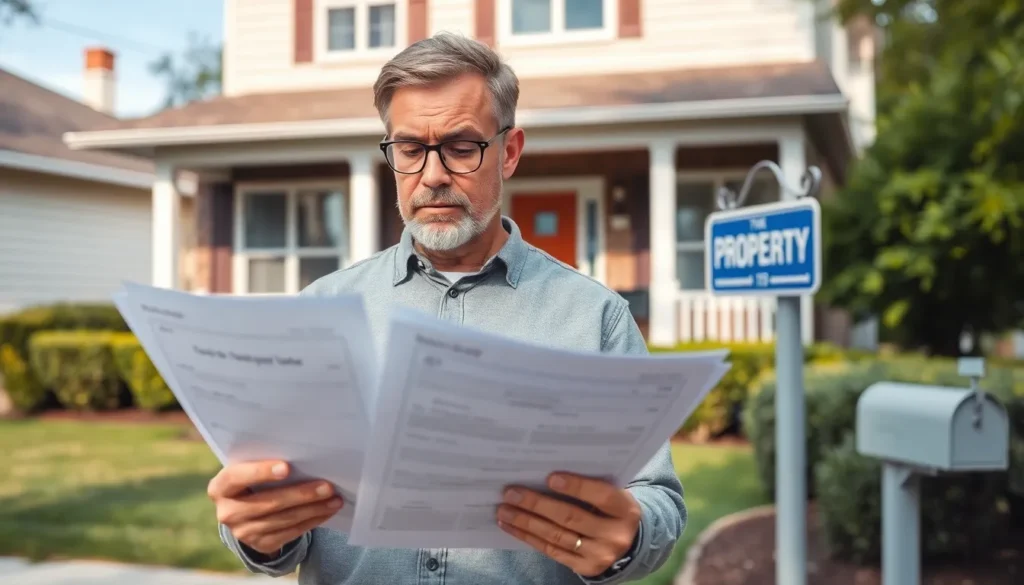Table of Contents
ToggleIn a world where city living often feels like a financial black hole, rural house hacking emerges as the superhero we didn’t know we needed. Imagine trading the hustle and bustle for wide-open spaces while still raking in some cash. It sounds like a dream, right? But it’s not just for the thrill-seekers or the adventurous souls; it’s a savvy strategy for anyone looking to maximize their property potential.
What Is Rural House Hacking?
Rural house hacking offers a method for homeowners to reduce living expenses and generate additional income. This approach involves utilizing property in less densely populated areas while taking advantage of lower costs and unique rental opportunities.
Definition and Concept
Rural house hacking involves renting out part of a residential property in a rural setting. Homeowners can occupy one portion while leasing another unit or space to tenants. By implementing this strategy, individuals benefit from significantly lower mortgage and utility costs. Extra income can come from renting out a guesthouse, basement, or even a portion of the main house. This method suits those seeking financial stability without compromising lifestyle or quality of living. Emphasizing community and connection, rural environments often foster tenant relationships that benefit all parties involved.
How It Differs From Urban House Hacking
Urban house hacking typically features higher property values and rental prices, creating different financial dynamics. Renters in urban settings often occupy units in multi-family buildings or shared living spaces. In contrast, rural options present larger properties with potential for diverse rental configurations. Additionally, rural areas offer less competition, allowing for more flexible leasing terms and relationships with tenants. While urban house hacking maximizes rent from limited space, rural house hacking leverages space and affordability for sustainable income generation. Ultimately, these approaches cater to different lifestyles and investment strategies, appealing to a broader audience.
Benefits of Rural House Hacking
Rural house hacking offers several compelling advantages. Homeowners enjoy significant cost savings, strengthen community ties, and experience unique lifestyle benefits.
Cost Savings
Cost savings emerge as a primary advantage. Reduced mortgage and utility expenses provide immediate financial relief. Homeowners often rent guesthouses or spare rooms, creating a dual-income stream. Lower property taxes in rural areas further enhance affordability. This financial strategy enables individuals to prioritize other investments or decrease overall debt.
Community Engagement
Community engagement plays a vital role in rural house hacking. Renting to local residents fosters connections and strengthens neighborhood bonds. Homeowners become part of a supportive network, which enhances the living experience. Engaging with long-term renters often leads to lasting friendships and increased local involvement. Residents frequently participate in community events, enriching their social lives.
Lifestyle Benefits
Lifestyle benefits consistently attract individuals to rural house hacking. Spacious properties provide ample outdoor space for personal enjoyment and recreation. Residents often embrace a slower pace of life, characterized by scenic views and tranquility. Access to nature encourages outdoor activities like gardening, hiking, or cycling, thereby enhancing overall well-being. This approach supports a work-life balance that urban living often disrupts.
Challenges of Rural House Hacking
Rural house hacking presents several challenges that aspiring homeowners should consider.
Property Management
Effective property management proves essential for rural house hackers. Managing rentals involves tasks like tenant screening, maintenance, and communication. Both time and effort can increase significantly, particularly in less populated areas where professional services may be scarce. Homeowners must be prepared to address tenant needs promptly. Ample knowledge about property maintenance helps reduce long-term costs, fostering a positive rental experience. Understanding local rental markets enhances property appeal, ensuring optimal tenant retention.
Market Limitations
Rural housing markets often differ from urban counterparts, presenting unique limitations. Demand for rental properties tends to vary, leading to potential vacancies. Homeowners may encounter fewer tenants in remote locations. Additionally, the lack of retail establishments nearby can deter potential renters. Proper market research helps landlords gauge rental prices and competition, ensuring fair pricing. These dynamics necessitate strategic planning to maintain profitability amid fluctuating demand.
Zoning Regulations
Navigating zoning regulations demands attention from rural house hackers. Local laws can restrict modifications or limit rental options. Understanding these regulations is crucial before making property changes or initiating rental agreements. Homeowners must research local ordinances to avoid costly fines or legal issues. Securing the necessary permits fosters compliance and helps maintain property value. Being informed about zoning rules ensures that homeowners maximize their property’s potential while adhering to legal standards.
Tips for Successful Rural House Hacking
Rural house hacking offers unique opportunities for generating income and reducing living costs. It’s essential to approach this strategy with careful consideration and planning.
Finding the Right Property
Location plays a crucial role in selecting a rural property. Consider areas with growing communities and demand for rental spaces. Features like guesthouses, separate entrances, and ample parking enhance rental potential. Proximity to local attractions or amenities can attract more tenants. Inspect the property’s condition before purchasing, as this can impact ongoing maintenance costs. Understanding local zoning laws is also essential for ensuring the property meets rental requirements.
Ideal Tenant Selection
Selecting suitable tenants helps ensure a successful rental experience. Begin by creating a detailed rental application to screen candidates effectively. Use this application to assess financial stability and rental history. Reference checks further validate their reliability as tenants. Consider offering a trial period to evaluate tenant compatibility before making a long-term commitment. Cultivating good communication builds trust, leading to happier, more responsible tenants who respect the property.
Maximizing Rental Income
Maximizing rental income requires strategic planning and marketing. Advertise the property across multiple online platforms to increase visibility. Set competitive rental rates based on local market research and property features. Offering additional amenities, like furnished spaces or utilities included in the rent, can attract more tenants. Regularly updating the property with modern finishes or repairs ensures it remains appealing. Hosting open houses provides direct interaction with potential renters, allowing for personal connection and maximizing occupancy.
Conclusion
Rural house hacking offers a unique opportunity for individuals looking to alleviate financial burdens while enjoying a fulfilling lifestyle. By embracing this approach, homeowners can unlock the potential of their properties and create sustainable income streams. The charm of rural living combined with the benefits of property rental fosters a sense of community and personal well-being.
Those willing to navigate the challenges and invest time in property management can reap significant rewards. With careful planning and strategic decision-making, rural house hacking can transform a property into a valuable asset, providing not just financial relief but also a richer quality of life. This innovative strategy stands as a compelling alternative to traditional urban living, making it an appealing choice for many.







